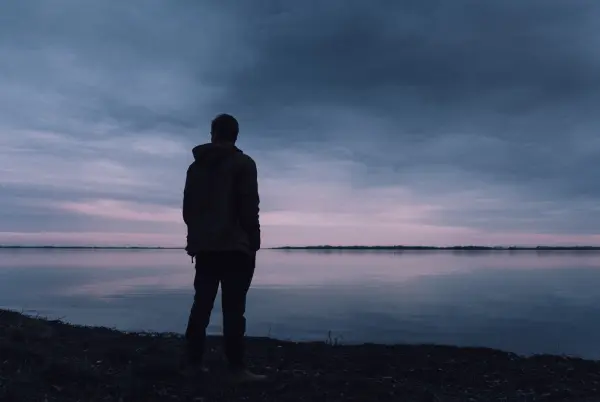Supporting Dads and Partners After Baby Loss: How to Grieve, Lead, and Heal Together

When a baby dies, the world often rushes to the mother’s side. Meals are dropped off, flowers delivered, and check-ins are directed toward her. While this support is essential, it can unintentionally leave another grieving parent in the shadows: dads and partners. Their grief is real, raw, and often overlooked. They are expected to be the “strong ones,” yet inside, they are mourning the loss of their child while carrying the weight of supporting their partner, their family, and themselves.
This post is for the dads and partners who feel unseen. It’s for the professionals and loved ones who want to understand how best to walk alongside them. And it’s for families who need reassurance that partners’ grief matters just as much as anyone else’s.
1. Acknowledge Their Grief Is Real
One of the most important truths to affirm is that dads and partners grieve too. Their pain may not always look the same as a mother’s, but it is no less valid. Partners often feel pressure to “stay strong” and may push their emotions down, believing their role is to hold everything together. But grief denied is grief delayed.
Partners need permission to express their emotions. Whether that means crying, writing, or even just sitting in silence. Simple reminders like, “Your grief may look different, and that’s okay. Your loss is real and valid,” can be healing words. Allowing and giving time for them to express how their grief looks and feels is essential.
2. Care for Yourself to Care for Others
Grief takes a toll on the body as much as the mind. Partners often focus so much on caring for their loved ones that they neglect their own needs. But you cannot pour from an empty cup. We need to start with the basics: sleep, sun, movement, and water. These four things may feel simple, but they regulate stress hormones, stabilize mood, and support physical healing. Take small, manageable steps: go for a walk, drink a full water bottle, or go to bed an hour earlier. These habits are not luxuries; they are survival tools.
3. Find Your Own Outlets for Grief
Partners may process grief differently. Some find it helpful to write letters to their baby, journal their feelings, or work with their hands on something meaningful. Rituals like planting a tree, holding a small ceremony, or creating a keepsake box can help turn invisible grief into something tangible.
Don’t be afraid to seek spaces that are specifically for dads. There are support groups, counselors, and even books written for fathers after loss, such as He Lost His Baby Too. These spaces normalize male grief and provide reassurance that you are not alone.
4. Communication Is Leadership
Being a partner after loss often means stepping into the role of communicator and boundary holder. Sometimes with family, sometimes with children, sometimes with medical staff. This can feel like an impossible burden, but clear communication is an act of leadership and love.
Scripts can help. When sharing news with extended family, it’s okay to set boundaries: “We’ve experienced a devastating loss and ask for privacy as we grieve. Thank you for respecting our space.”.
If you have living children, open and honest conversations matter. Use age-appropriate language and reassure them that their feelings are valid. Saying, “The baby’s body stopped working and couldn’t stay with us. It’s okay to feel sad, mad, or confused; we’ll get through this together,” helps children process grief without confusion or misplaced guilt.
5. Support Your Partner Without Losing Yourself
In the aftermath of loss, partners are often pulled in two directions. Caring for their grieving spouse while also trying to carry the weight of their own emotions. It’s not an either/or. You can do both, but it requires balance. Supporting your partner does not mean ignoring your own grief.
Practical ways to help, including managing meals, handling errands, or updating family members, can ease your partner’s burden. But just as important is creating space for their emotions, even if they don’t mirror your own. One of you may cry openly while the other goes quiet. Neither way is “better” or “worse.” Grief shows up differently in everyone. The key is to honor and validate those differences, reminding yourselves that “different” is not wrong. It’s simply another way of loving and grieving. My husband and I felt a lot of resentment around communicating and how we grieved differently. We didn’t know anything about grief; this was the first experience where grief buried us both, and we had no idea what to do. We decided to seek out marriage counseling so that we could learn how to grieve together, but also understand each other and what we each needed. A neutral third party is a helpful tool to support you.
6. Seek Community
Isolation is one of the hardest parts of grief. Partners may feel like no one understands their pain, especially when cultural messages suggest “men don’t cry” or that dads should just “move on.” This is even more intense in military families, where stoicism and resilience are expected. I mention military families because we were one when we lost our daughter, Evelyn, who was stillborn in 2019. Our military community came together and feed us and supported us when we didn’t know what we needed.
Community is a lifeline. Whether through peer support groups, military family readiness groups, or online spaces like Union of Dads, connection provides validation and hope. Even sitting quietly in a group, knowing others share your story, can ease the weight of loneliness. There are podcasts that are just for Dads and could be a great place to share your story or just listen to others. There are Guys and Grief and Dad Still Standing.
7. Give Yourself Patience
Grief does not follow a straight path. Some days you may feel like you can breathe again, and other days it can feel impossible to get through. Partners sometimes carry guilt for moments of laughter or lightness, and shame for still feeling broken months or even years later. The truth is that grief has no timeline.
Being patient with yourself is one of the greatest gifts you can give in this process. Healing does not mean forgetting your baby. Healing means finding tender ways to carry their memory with you while continuing to live. It means allowing your grief to unfold in its own time, without judgment, and trusting that love will always remain.
8. Lead by Honoring, Not Fixing
Partners often feel the urge to fix the pain, to make things better, or to take away the suffering of their loved ones. But grief is not something that can be fixed. It is not a problem to solve; it is an experience to live through. What families need most is not solutions, but presence.
True leadership after loss is not about having all the answers. It is about showing vulnerability, about being willing to sit in the hard places with your partner and your family. It is about honoring your baby’s memory in everyday life and creating rituals that give your family permission to remember together.
There are so many simple yet powerful ways to do this. Light a candle on anniversaries. Bake a cake or share a meal on your baby’s birthday. Speak their name freely and often. Display their photos or keepsakes where you can see them. Plant a tree or a flower in their honor. Write letters and keep them in a journal or memory box. Attend remembrance walks or join awareness events as a family.
These small acts carry a big message. They tell your family and your heart that your child’s life matters, that their memory continues to shape your story, and that love does not end when life does. When you lead with remembrance, you create safety for everyone around you to grieve openly, and you show your partner and children that it is okay to carry both sorrow and love at the same time.
Supporting yourself and your family after pregnancy or baby loss as a dad or partner is about balance: balancing strength with vulnerability, support with self-care, and grief with hope. You don’t have to choose between being the steady one and being the grieving one. You can be both.
Your role is vital, your grief is valid, and your leadership can guide your family through this unimaginable time. Not by fixing the unfixable, but by showing up. Honestly, vulnerably, and with love.
Meet Vallen
I’m Vallen Webb. I’m a mom to five, a bereavement and postpartum doula, a podcast host, a grief advocate, and the founder of Evelyn James & Company. But more than that, I’m just a mom who had to learn how to live again after her baby died.
And if you’re walking that path too, I see you. I love you. And I’m here.
Find more resources created by Vallen at Evelyn James & Company.
Other articles in this series by Vallen:
Supporting Dads and Partners After Baby Loss: How to Grieve, Lead, and Heal Together
Pregnant After Loss: Holding Fear, Hope, and Everything In Between
When Their Sibling Dies: How to Support Children After Pregnancy or Infant Loss
Community, Culture, and Compassion: Healing Together After Baby Loss
Complicated Motherhood: Navigating the Before and After of Baby Loss
Supportive Resources Selected by Vallen
Books & Guides
He Lost His Baby Too by Kelly Farley and David DiColoa
Organizations & Support
Postpartum Support International Dad Group
Postpartum Support International (Hotline, Provider Directory & Resources)
Evelyn James & Co Support Guides
Shop
Evelyn James Grief Marketplace
{{subscribe}}
{{trendingoffer}}
Thank you for being part of the Villie family 💜


.jpg)


.avif)